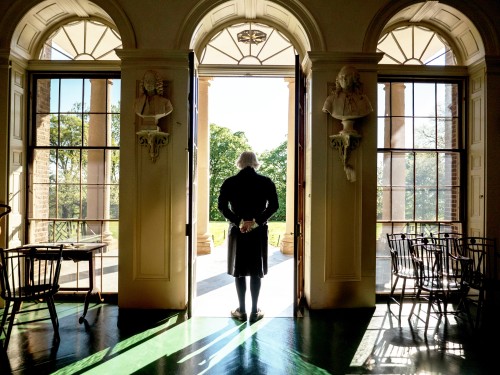 Archaeology of Chesapeake Slavery and Landscape
Archaeology of Chesapeake Slavery and Landscape
Anthropology 5589
6 credits
Six week session: June 3 - July 12, 2019
Monticello's Department of Archaeology and the University of Virginia are pleased to offer a six-week archaeological field school at Monticello from June 3 through July 12, 2019. The program offers six credits to undergraduate and graduate students through the University of Virginia's College of Arts and Sciences. The Monticello-UVA Field School accepts applications from undergraduate students as well as postgraduates. A current or previous affiliation with UVA is not required to attend the field school.
Video courtesy UVA Today
Monticello will offer successful applicants half-tuition scholarships. Since space is limited to twelve students, please be sure to have all application materials submitted by deadline: April 15, 2019.
The Program The Monticello field school offers a hands-on introduction to basic excavation, recording, and laboratory techniques in archaeology. The course emphasizes a scientific, multidisciplinary approach to doing landscape archaeology. It also provides the opportunity to contribute to cutting-edge research into the ecological and social dynamics that unfolded on Thomas Jefferson’s Monticello Plantation in the eighteenth and early nineteenth centuries. Technical topics covered include survey and excavation strategies as well as the analytical possibilities for ceramics, faunal remains, plant phytoliths and pollen, deposits and the sediments they contain, soils, and spatial distributions of artifacts across sites and larger landscapes. Guest lecturers are drawn from a variety of disciplines including archaeology, geology, ecology, paleoethnobotany, zooarchaeology, and history. On-site instruction, lectures, and discussion sessions at Monticello will be complemented by field trips to related sites. Students will attend classes forty hours per week, with the bulk of that time spent working in the field and the lab. Reading assignments, lectures, and discussion sessions will cover both technical and historical issues. Research Focus The focus of our field research in 2019 is Site 6, a domestic site that was home to enslaved field laborers in the early-nineteenth century, after the transition to wheat. We have discovered evidence for two distinct houses at the site, each with distinctive artifact assemblages and spatial organization. Our current working hypothesis is that one household represents a family, while the other represents a group of unrelated individuals. Our major goal this summer is to collect the data that will allow us to more rigorously evaluate this idea. Requirements Tuition rates are set by the University of Virginia and vary by residency status (see this link for details: http://summer.virginia.edu/tuition-and-fees). For Virginia residents, total field-school tuition for 6 credits is $2,376 for undergraduates and $2,724 for graduate students. For non-residents, tuition is $8,652 for undergraduates and $5,532 for graduate students. All students accepted into the field school will receive scholarships from Monticello worth half the tuition charge. Room and Board Air conditioned housing at the University of Virginia is available to Students at an estimated cost of $41 per night or roughly $287 per week for a single room. Meals are available at an additional cost through University dining services, or students can choose to prepare their own meals. Numerous summer sublets are also available in Charlottesville, but students will need to make their own arrangements.
Send a one-page cover letter that outlines your interest in archaeology and a CV or resume that contains the names, addresses, and telephone numbers of three references. The application deadline is April 15, 2019. You can email your application to fieldschool@monticello.org. The snail mail address is: Monticello-University of Virginia Archaeological Field School
|
||||||||||||||||||||||||||||||||||||||||||||||||||||||||||||||||||||||||||||||||||||||||||||||||||||||

 Our fieldwork addresses changing patterns of land use and settlement on Thomas Jefferson's, Monticello Plantation from c. 1750 to 1860, along with their ecological and social causes and consequences. Toward the end of the 18th century, spurred by shifts in the Atlantic economy, Thomas Jefferson and planters across the Chesapeake region replaced tobacco cultivation with a more diversified agricultural regime, based around wheat. Our research is revealing the enormous implications of this shift for what the landscape looked like and how enslaved African-Americans worked and lived on it. Significant questions remain about the ecological processes that were unleashed, how they were experienced by slaves and slave owners, and the importance of changing slave work routines in explaining social dynamics among enslaved and free people.
Our fieldwork addresses changing patterns of land use and settlement on Thomas Jefferson's, Monticello Plantation from c. 1750 to 1860, along with their ecological and social causes and consequences. Toward the end of the 18th century, spurred by shifts in the Atlantic economy, Thomas Jefferson and planters across the Chesapeake region replaced tobacco cultivation with a more diversified agricultural regime, based around wheat. Our research is revealing the enormous implications of this shift for what the landscape looked like and how enslaved African-Americans worked and lived on it. Significant questions remain about the ecological processes that were unleashed, how they were experienced by slaves and slave owners, and the importance of changing slave work routines in explaining social dynamics among enslaved and free people. Tuition and Scholarships
Tuition and Scholarships To Apply
To Apply For further information about archaeological research at Monticello, visit our
For further information about archaeological research at Monticello, visit our